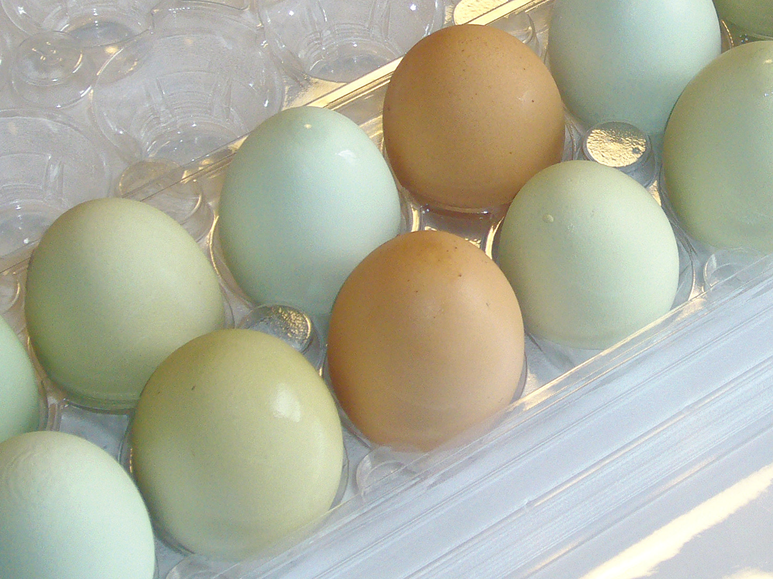Get Real Resolution: April is Easter Eggstravaganza
Easter is a fun time to dye and decorate hard-boiled eggs into rainbow-colored Easter eggs. But, did you know some eggs come “pre-colored” right from the chicken?
Eggshell colors can include pinks, greens, and blues in addition to white and brown. You can even find speckled eggs. Different breeds of chickens produce different egg colors. The shell color is a result of pigments that are secreted by the hen and deposited on the eggshell’s outer layers while she is making the egg.
Some people say that a hen will always lay an egg that is the same color as her earlobes. This happens often, but it is not always true. And, who knew chickens even had earlobes?
What Are The Best Eggs to Buy?
When we think about chickens, we like to picture them pecking around the barnyard of a family farm. But, this is not how most chickens are raised today. Most chickens are raised in cage operations and never see the outdoors. Both chickens and the eggs they produce are healthier when the chickens are raised in a way that allows them to live like, well, chickens.
Chickens need space to move around, fresh air, fresh food and natural feed. When we buy eggs from farms that raise chickens naturally, we help support farmers who provide fair and kind treatment to farm animals.
The best way to buy your eggs is to know where they come from and buy direct from a farmer. You can often find eggs along with fruit and vegetables at farmers’ markets. If you are buying your eggs from the store, there are a few labels that can help you find out how the chickens are treated.
Caged, cage-free, free range, pastured ... what does it all mean?
Cage and floor operations
These factory farms raise chickens in tiny, crowded, indoor cages. This is the worst environment for chicken welfare. If the egg carton does not say how the chickens are raised, they were likely caged because this is the lowest cost way to produce the most eggs. This sounds good for us, but it is not good for the chickens. In addition, large farms can also pollute the environment.
Cage-free
The term cage-free can mean that the chickens live in a pen. While this is better than the cage for chickens, this doesn’t always mean the pen is outdoors.
Free-range
Free-range means chickens have at least limited access to the outdoors and do not live in crowded cages.
Pastured
Pasture-raised is the best animal welfare environment for chickens. Not only do they have space to move around, but the chickens spend the most time outdoors and have access to some of their favorite grasses and bugs they love to eat. While eating grasses and bugs sounds pretty gross to you and me, chickens love them.
Happy Chickens, Healthy Eggs
When the chickens are happy, they are healthy and they produce healthier eggs. Healthier living conditions for the chickens mean they can be raised without added antibiotics. Pastured eggs are also higher in a healthy type of fat called Omega-3. A quick way to tell if one egg is healthier than another is to look at the yolks. Pastured eggs often have darker orange yolks that are rich in nutrients including six B vitamins, as well as vitamins A, D, and E and antioxidants. The eggs even taste better.
Recipes for Eggs
Ready to eat? Here are a few recipes for eggs. You make one of them with your own favorite ingredients. But, first a few safety tips:
• Always have a parent help with sharp knives and hot stoves
• Wash your hands after handling raw eggs
• Clean any kitchen surfaces that get raw egg on them
• Tap the egg twice gently on the counter or edge of your bowl to crack it. Pull the eggshell apart to avoid getting shell pieces in your recipe
• Cracking the farm-fresh eggs individually into a cup before adding them to the bowl with the cracked eggs and ingredients is a way to avoid getting shells in your food.
• If you do get eggshell in the bowl, remove it before adding other ingredients.
Best Hard-boiled Eggs
Place eggs in a single layer in a pan and cover with an inch of cold water. Have an adult help with the stove. Gently bring the water to a boil so the eggs don’t crack. Reduce the heat to a simmer for one minute. Then, remove the pan from the heat. Cover the pan, and let it sit for about 10-12 minutes.
Have an adult strain the hot water from the pan, and cool the eggs by adding cold water. Strain, add cold water again, and let the eggs cool. Your hard-boiled eggs will have tender, yellow centers without the green edge. They can be stored in the refrigerator, covered, for five days.
Kid’s Scramble
Scrambled eggs are one of the easiest dishes to learn to make. You can make your own version of these scrambled eggs by adding your favorite ingredients like cheddar cheese, fresh herbs, or red peppers. Be creative. This recipe uses chopped spinach to make your very own “Green Eggs and Ham”.
Parents’ Content:
Talking to kids about where meat, eggs, and milk come from can be a challenge. There is a lot of unfortunate reality with factory-farmed meat when it comes to both food safety and animal welfare. The best way to have this conversation may be to show your kids examples of good animal welfare and explain why these farming practices are better for the animals, for us, and for the environment.
If you take the opportunity to embrace spring weather, you may even take your kids to a local farm for their own “egg hunt” and buy some farm fresh eggs. Here are a few important questions to ask the farmer so you can be sure you are getting the best eggs possible and know about the animal welfare.
1. Are chickens allowed a natural and varied diet along with grain?
2. How much access to pasture do the chickens have?
3. How long do they get to be outdoors?
4. What are “cage-free” conditions like?
5. What type of feed is the chickens’ diet supplemented with?
6. Is the feed free of animal byproducts (vegetarian)?
7. Is the feed supplemented with high Omega-3 sources like flax seed?
8. Was the chicken ever fed antibiotics?
9. Was the chicken ever force molted?
Follow our blog for monthly challenges:
www.ediblekansascity.com or www.cleanerplateclub.com







